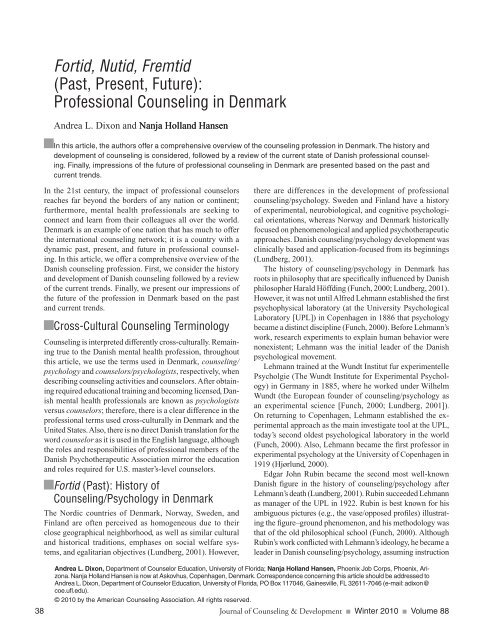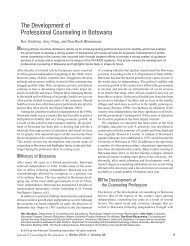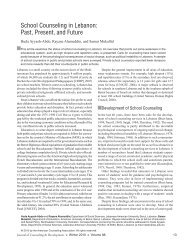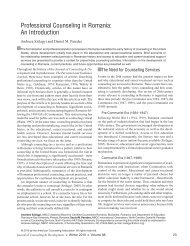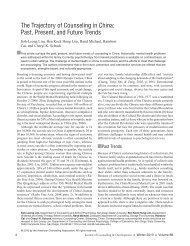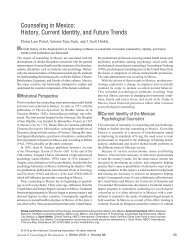Professional Counseling in Denmark - IRCEP
Professional Counseling in Denmark - IRCEP
Professional Counseling in Denmark - IRCEP
Create successful ePaper yourself
Turn your PDF publications into a flip-book with our unique Google optimized e-Paper software.
Fortid, Nutid, Fremtid<br />
(Past, Present, Future):<br />
<strong>Professional</strong> <strong>Counsel<strong>in</strong>g</strong> <strong>in</strong> <strong>Denmark</strong><br />
Andrea L. Dixon and Nanja Holland Hansen<br />
In this article, the authors offer a comprehensive overview of the counsel<strong>in</strong>g profession <strong>in</strong> <strong>Denmark</strong>. The history and<br />
development of counsel<strong>in</strong>g is considered, followed by a review of the current state of Danish professional counsel<strong>in</strong>g.<br />
F<strong>in</strong>ally, impressions of the future of professional counsel<strong>in</strong>g <strong>in</strong> <strong>Denmark</strong> are presented based on the past and<br />
current trends.<br />
In the 21st century, the impact of professional counselors<br />
reaches far beyond the borders of any nation or cont<strong>in</strong>ent;<br />
furthermore, mental health professionals are seek<strong>in</strong>g to<br />
connect and learn from their colleagues all over the world.<br />
<strong>Denmark</strong> is an example of one nation that has much to offer<br />
the <strong>in</strong>ternational counsel<strong>in</strong>g network; it is a country with a<br />
dynamic past, present, and future <strong>in</strong> professional counsel<strong>in</strong>g.<br />
In this article, we offer a comprehensive overview of the<br />
Danish counsel<strong>in</strong>g profession. First, we consider the history<br />
and development of Danish counsel<strong>in</strong>g followed by a review<br />
of the current trends. F<strong>in</strong>ally, we present our impressions of<br />
the future of the profession <strong>in</strong> <strong>Denmark</strong> based on the past<br />
and current trends.<br />
Cross-Cultural <strong>Counsel<strong>in</strong>g</strong> Term<strong>in</strong>ology<br />
<strong>Counsel<strong>in</strong>g</strong> is <strong>in</strong>terpreted differently cross-culturally. Rema<strong>in</strong><strong>in</strong>g<br />
true to the Danish mental health profession, throughout<br />
this article, we use the terms used <strong>in</strong> <strong>Denmark</strong>, counsel<strong>in</strong>g/<br />
psychology and counselors/psychologists, respectively, when<br />
describ<strong>in</strong>g counsel<strong>in</strong>g activities and counselors. After obta<strong>in</strong><strong>in</strong>g<br />
required educational tra<strong>in</strong><strong>in</strong>g and becom<strong>in</strong>g licensed, Danish<br />
mental health professionals are known as psychologists<br />
versus counselors; therefore, there is a clear difference <strong>in</strong> the<br />
professional terms used cross-culturally <strong>in</strong> <strong>Denmark</strong> and the<br />
United States. Also, there is no direct Danish translation for the<br />
word counselor as it is used <strong>in</strong> the English language, although<br />
the roles and responsibilities of professional members of the<br />
Danish Psychotherapeutic Association mirror the education<br />
and roles required for U.S. master’s-level counselors.<br />
Fortid (Past): History of<br />
<strong>Counsel<strong>in</strong>g</strong>/Psychology <strong>in</strong> <strong>Denmark</strong><br />
The Nordic countries of <strong>Denmark</strong>, Norway, Sweden, and<br />
F<strong>in</strong>land are often perceived as homogeneous due to their<br />
close geographical neighborhood, as well as similar cultural<br />
and historical traditions, emphases on social welfare systems,<br />
and egalitarian objectives (Lundberg, 2001). However,<br />
there are differences <strong>in</strong> the development of professional<br />
counsel<strong>in</strong>g/psychology. Sweden and F<strong>in</strong>land have a history<br />
of experimental, neurobiological, and cognitive psychological<br />
orientations, whereas Norway and <strong>Denmark</strong> historically<br />
focused on phenomenological and applied psychotherapeutic<br />
approaches. Danish counsel<strong>in</strong>g/psychology development was<br />
cl<strong>in</strong>ically based and application-focused from its beg<strong>in</strong>n<strong>in</strong>gs<br />
(Lundberg, 2001).<br />
The history of counsel<strong>in</strong>g/psychology <strong>in</strong> <strong>Denmark</strong> has<br />
roots <strong>in</strong> philosophy that are specifically <strong>in</strong>fluenced by Danish<br />
philosopher Harald Höffd<strong>in</strong>g (Funch, 2000; Lundberg, 2001).<br />
However, it was not until Alfred Lehmann established the first<br />
psychophysical laboratory (at the University Psychological<br />
Laboratory [UPL]) <strong>in</strong> Copenhagen <strong>in</strong> 1886 that psychology<br />
became a dist<strong>in</strong>ct discipl<strong>in</strong>e (Funch, 2000). Before Lehmann’s<br />
work, research experiments to expla<strong>in</strong> human behavior were<br />
nonexistent; Lehmann was the <strong>in</strong>itial leader of the Danish<br />
psychological movement.<br />
Lehmann tra<strong>in</strong>ed at the Wundt Institut fur experimentelle<br />
Psycholgie (The Wundt Institute for Experimental Psychology)<br />
<strong>in</strong> Germany <strong>in</strong> 1885, where he worked under Wilhelm<br />
Wundt (the European founder of counsel<strong>in</strong>g/psychology as<br />
an experimental science [Funch, 2000; Lundberg, 2001]).<br />
On return<strong>in</strong>g to Copenhagen, Lehmann established the experimental<br />
approach as the ma<strong>in</strong> <strong>in</strong>vestigate tool at the UPL,<br />
today’s second oldest psychological laboratory <strong>in</strong> the world<br />
(Funch, 2000). Also, Lehmann became the first professor <strong>in</strong><br />
experimental psychology at the University of Copenhagen <strong>in</strong><br />
1919 (Hjørlund, 2000).<br />
Edgar John Rub<strong>in</strong> became the second most well-known<br />
Danish figure <strong>in</strong> the history of counsel<strong>in</strong>g/psychology after<br />
Lehmann’s death (Lundberg, 2001). Rub<strong>in</strong> succeeded Lehmann<br />
as manager of the UPL <strong>in</strong> 1922. Rub<strong>in</strong> is best known for his<br />
ambiguous pictures (e.g., the vase/opposed profiles) illustrat<strong>in</strong>g<br />
the figure–ground phenomenon, and his methodology was<br />
that of the old philosophical school (Funch, 2000). Although<br />
Rub<strong>in</strong>’s work conflicted with Lehmann’s ideology, he became a<br />
leader <strong>in</strong> Danish counsel<strong>in</strong>g/psychology, assum<strong>in</strong>g <strong>in</strong>struction<br />
38<br />
Andrea L. Dixon, Department of Counselor Education, University of Florida; Nanja Holland Hansen, Phoenix Job Corps, Phoenix, Arizona.<br />
Nanja Holland Hansen is now at Askovhus, Copenhagen, <strong>Denmark</strong>. Correspondence concern<strong>in</strong>g this article should be addressed to<br />
Andrea L. Dixon, Department of Counselor Education, University of Florida, PO Box 117046, Ga<strong>in</strong>esville, FL 32611-7046 (e-mail: adixon@<br />
coe.ufl.edu).<br />
© 2010 by the American <strong>Counsel<strong>in</strong>g</strong> Association. All rights reserved.<br />
Journal of <strong>Counsel<strong>in</strong>g</strong> & Development ■ W<strong>in</strong>ter 2010 ■ Volume 88
<strong>Professional</strong> <strong>Counsel<strong>in</strong>g</strong> <strong>in</strong> <strong>Denmark</strong><br />
of experimental pedagogy and chair<strong>in</strong>g the psychology department<br />
<strong>in</strong> Copenhagen from 1921 to 1951. Dur<strong>in</strong>g the 1950s<br />
and 1960s, Rub<strong>in</strong>’s successors upheld his phenomenological<br />
tradition and developed it further for use <strong>in</strong> Danish <strong>in</strong>dividual<br />
counsel<strong>in</strong>g/psychological practice (Hjørlund, 2000). Each of<br />
these early Danish historical psychological leaders focused on<br />
applied psychology (therapy) and produced little counsel<strong>in</strong>g/<br />
psychological research (Lundberg, 2001). Low research productivity<br />
cont<strong>in</strong>ued <strong>in</strong> Danish counsel<strong>in</strong>g/psychology despite<br />
the establishment of a counsel<strong>in</strong>g/psychology department at the<br />
University of Århus dur<strong>in</strong>g the 1960s (Lundberg, 2001).<br />
The Danish counsel<strong>in</strong>g/psychological movement rapidly<br />
progressed throughout the 20th century, and, <strong>in</strong> 1905, the<br />
Association for Psychological Research was established<br />
<strong>in</strong> <strong>Denmark</strong> (Hjørlund, 2000). In 1914, the Association for<br />
Experimental Pedagogy was established, which marked the<br />
beg<strong>in</strong>n<strong>in</strong>g of Danish school psychology (Hjørlund, 2000). The<br />
only opportunity to study counsel<strong>in</strong>g/psychology <strong>in</strong> <strong>Denmark</strong><br />
before 1918 was through the effort to obta<strong>in</strong> a master of arts<br />
degree <strong>in</strong> philosophy with a psychology focus; however, by<br />
the end of the 1920s, a master of arts degree <strong>in</strong> psychology<br />
was <strong>in</strong>troduced at the University of Copenhagen.<br />
Throughout the 1920s and 1930s, a number of counsel<strong>in</strong>g/<br />
psychology-focused publications were produced by Danish<br />
professionals, and school psychology flourished. As a consequence<br />
of World Wars I and II, there was a marked need for<br />
school psychologists <strong>in</strong> social services, prisons and military<br />
systems, and bus<strong>in</strong>ess (Jensen, 2000). In response to this need,<br />
a 3-year master of psychology-pedagogy degree appeared at<br />
the University of Copenhagen <strong>in</strong> 1944, and, <strong>in</strong> 1947, the first<br />
group of Danish school psychologists graduated. In the 1960s,<br />
the master of psychology-pedagogy degree became a master<br />
of psychology degree.<br />
In 1947, the Dansk Psykolog Foren<strong>in</strong>g (DPF [Danish Psychological<br />
Association]) was established (Hjørlund, 2000). By<br />
1957, the need for licensure expectations and laws was raised<br />
by the jo<strong>in</strong>t council of Nordic countries, and, <strong>in</strong> 1958, council<br />
members made recommendations; however, it took 37 years<br />
before psychological licensure laws took effect (Jensen, 2000).<br />
In the late 1940s, the first counsel<strong>in</strong>g/psychological treatment<br />
centers were established <strong>in</strong> <strong>Denmark</strong>, and, <strong>in</strong> 1950, the first<br />
child guidance center opened at the University of Copenhagen<br />
(Hjørlund, 2000).<br />
A 1968 student-led protest at the University of Copenhagen<br />
had a great <strong>in</strong>fluence on the profession (Hjørlund, 2000). The<br />
protest was a reaction to the Vietnam War, capitalism, and<br />
nuclear weapons, as well as the drastic <strong>in</strong>creases <strong>in</strong> the number<br />
of students at the university. Furthermore, there had been no<br />
<strong>in</strong>creases <strong>in</strong> the number of university professors, which led<br />
to poor educational conditions (Hjørlund, 2000). After the<br />
highly publicized protest, <strong>in</strong>ternational psychological<br />
ideas such as existentialism and Marxism were <strong>in</strong>troduced<br />
<strong>in</strong>to Danish counsel<strong>in</strong>g/psychology (Hjørlund, 2000). One<br />
counselor/psychologist shared, “With the student revolt <strong>in</strong><br />
1968, there came an <strong>in</strong>creased <strong>in</strong>terest <strong>in</strong> psychotherapy and<br />
other activities around psychological development” (Anonymous,<br />
personal communication, July 15, 2007).<br />
Start<strong>in</strong>g <strong>in</strong> the 1980s and cont<strong>in</strong>u<strong>in</strong>g throughout the 1990s,<br />
the number of <strong>in</strong>ternational refugees relocat<strong>in</strong>g to <strong>Denmark</strong><br />
(ma<strong>in</strong>ly from East Europe and Africa) created needs for<br />
additional applied counsel<strong>in</strong>g/psychological <strong>in</strong>terventions<br />
(Hjørlund, 2000). In 1985, The Center for Bra<strong>in</strong> Damage<br />
was founded at the College of Humanistic Studies at the<br />
University of Copenhagen by the neurological-psychologist<br />
Anne-Lise Christensen; this center represented the new focus<br />
<strong>in</strong> Danish counsel<strong>in</strong>g/psychology: cognitive approaches<br />
(Hjørlund, 2000).<br />
Throughout the 1980s, the Nordic countries worked together<br />
to develop their own set of counsel<strong>in</strong>g/psychological<br />
ethical codes (Lunt, 1999) apart from the European Federation<br />
of Psychologists’ Associations’ (EFPA’s; 1995) Charter of<br />
<strong>Professional</strong> Ethics for Psychologists. The Nordic countries<br />
used the European charter as the basis for cocreat<strong>in</strong>g the Ethical<br />
Code for Nordic Psychologists (DPF, n.d.). The Nordic<br />
code was revised dur<strong>in</strong>g 1996–1997, was officially adopted<br />
<strong>in</strong> <strong>Denmark</strong> <strong>in</strong> 1999, and <strong>in</strong>cludes four ethical areas of the<br />
DPF: respect for clients’ rights and dignity, competence,<br />
responsibility, and <strong>in</strong>tegrity (DPF, n.d.).<br />
In 1993, counselors/psychologists ga<strong>in</strong>ed public licensure<br />
from the M<strong>in</strong>istry of Social Affairs, and a committee was<br />
formed to evaluate counselors’/psychologists’ qualifications:<br />
the Psykolognævnet (Danish Board of Psychological<br />
Practice [DBPP]; Jensen, 2000). The actual Danish licensure<br />
guidel<strong>in</strong>es for counselors/psychologists were established <strong>in</strong><br />
1994 (DBPP, n.d.).<br />
The <strong>in</strong>creas<strong>in</strong>g need for Danish counselors/psychologists<br />
cont<strong>in</strong>ued <strong>in</strong> the 1990s for the purposes of work<strong>in</strong>g with<br />
emergency medical teams <strong>in</strong> crisis <strong>in</strong>tervention situations. In<br />
the late 1990s, the number of counsel<strong>in</strong>g/psychology students<br />
had greatly <strong>in</strong>creased, and so had the membership of the DPF<br />
(Hjørlund, 2000). In 1998, it was noted that the number of<br />
practic<strong>in</strong>g counselors/psychologists had risen dramatically<br />
from 23 practic<strong>in</strong>g counselors/psychologists <strong>in</strong> 1983 to 848<br />
<strong>in</strong> 1998 (DPF, n.d.), and, <strong>in</strong> November 2006, the membership<br />
of the DPF was 7,705. The counsel<strong>in</strong>g/psychology profession<br />
<strong>in</strong> <strong>Denmark</strong> was shaped by dynamic historical leaders and<br />
events that converged to form the current <strong>in</strong>fluence Danish<br />
counselors/psychologists have today.<br />
Her og Nu (Here and Now): The Current<br />
State of <strong>Counsel<strong>in</strong>g</strong>/Psychology <strong>in</strong><br />
<strong>Denmark</strong><br />
<strong>Denmark</strong> is consistently voted one of the “Best Countries<br />
<strong>in</strong> the World” to live <strong>in</strong> (Statistics <strong>Denmark</strong>, 2007), and <strong>in</strong><br />
a 2006 survey conducted by Adrian White of the United<br />
K<strong>in</strong>gdom’s University of Leicester, <strong>Denmark</strong> ranked as<br />
the “happiest place on Earth” out of all the countries <strong>in</strong> the<br />
Journal of <strong>Counsel<strong>in</strong>g</strong> & Development ■ W<strong>in</strong>ter 2010 ■ Volume 88 39
Dixon & Hansen<br />
world (White, 2007). With a population of approximately<br />
5,450,661 (Statistics <strong>Denmark</strong>, 2007), <strong>Denmark</strong> also has<br />
the greatest self-reported overall well-be<strong>in</strong>g <strong>in</strong> the world<br />
(White, 2007). These reports parallel the current positive state<br />
of counsel<strong>in</strong>g/psychology <strong>in</strong> <strong>Denmark</strong>; professional trends illustrate<br />
that therapy is more accepted than ever before (DPF,<br />
n.d.). In fact, one Danish counselor/psychologist reported,<br />
“Throughout the 1990s there was a grow<strong>in</strong>g <strong>in</strong>terest to<br />
work on personal development. To seek psychotherapy has<br />
become normal and counselors/psychologists have a greater<br />
and more visible space <strong>in</strong> the public” (Anonymous, personal<br />
communication, July 15, 2007). There are currently more<br />
than 7,700 authorized counselors/psychologists practic<strong>in</strong>g<br />
or tra<strong>in</strong><strong>in</strong>g (DPF, n.d.).<br />
The DPF reports that the <strong>in</strong>creased use of counsel<strong>in</strong>g/<br />
psychological services is partly due to the Danish government’s<br />
decision to channel subsidies <strong>in</strong>to this professional<br />
sector, mak<strong>in</strong>g counsel<strong>in</strong>g/psychological services more f<strong>in</strong>ancially<br />
possible (DPF, n.d.). Thus, there is now less of a stigma<br />
attached to seek<strong>in</strong>g therapy <strong>in</strong> <strong>Denmark</strong> (DPF, n.d.), and the<br />
<strong>in</strong>crease <strong>in</strong> counselors/psychologists work<strong>in</strong>g <strong>in</strong> bus<strong>in</strong>ess organizations<br />
has also allowed for more <strong>in</strong>dividuals to seek therapy<br />
(Jensen, 2000). However, one Danish counselor/psychologist<br />
added, “There is still no help from the public health care sector<br />
for people who suffer from stress and depression. The cost<br />
to see a private practice psychologist is expensive and makes<br />
it impossible for many who would benefit to obta<strong>in</strong> help”<br />
(Anonymous, personal communication, July 15, 2007).<br />
Currently, approximately 15% of Danish counselors/<br />
psychologists are employed <strong>in</strong> private practice, 60% <strong>in</strong> the<br />
public sector, and 12% <strong>in</strong> private companies; furthermore, approximately<br />
10% are unemployed and 3% are retired (EFPA,<br />
1999). Like other counselors/psychologists, Danish counselors/<br />
psychologists who are members of certa<strong>in</strong> professional organizations<br />
have specific guidel<strong>in</strong>es, ethics, and labels to which<br />
they are expected to adhere. The DBPP (n.d.) regards the term<br />
psychologist as a protected title and states that only <strong>in</strong>dividuals<br />
with a master’s degree <strong>in</strong> psychology from a university can use<br />
the title of psychologist. In addition, the DBPP (n.d.) stated that<br />
<strong>in</strong>dividuals can use the title authorized psychologist if they are<br />
psychologists who have documented the completion of supplementary,<br />
practical tra<strong>in</strong><strong>in</strong>g of at least 2 years.<br />
Although the term psychologist is the primary mental<br />
health label used <strong>in</strong> <strong>Denmark</strong>, the term psychotherapist is used<br />
by <strong>in</strong>dividuals who practice applied counsel<strong>in</strong>g <strong>in</strong>tervention<br />
(the equivalent of U.S. professional counselors). The Psykoterapeut<br />
Foren<strong>in</strong>gen (PF [PsychotherapeuticAssociation]) was<br />
established <strong>in</strong> 1993 as an <strong>in</strong>terest organization for professional<br />
psychotherapists. To become a member of the association, an<br />
<strong>in</strong>dividual must have a bachelor’s degree <strong>in</strong> psychology, social<br />
work, education, or nurs<strong>in</strong>g (PF, n.d.) and must have 250 hours<br />
of personal therapy, 150 hours of supervision, and 300 hours<br />
of theory. At this time, the PF is the only known professional<br />
Danish group promot<strong>in</strong>g the development of the profession of<br />
counsel<strong>in</strong>g as a separate discipl<strong>in</strong>e from psychology.<br />
Currently, there are no specific tra<strong>in</strong><strong>in</strong>g programs or licensure/<br />
certification guidel<strong>in</strong>es for psychotherapists <strong>in</strong> <strong>Denmark</strong>, and<br />
there are no licensure or certification requirements for psychotherapists<br />
who do not belong to the PF (PF, n.d.). In 2004,<br />
the Danish m<strong>in</strong>istries of education, social welfare, national<br />
policies, and health collaborated to develop criteria for the<br />
<strong>in</strong>stitutions tra<strong>in</strong><strong>in</strong>g psychotherapists, and, <strong>in</strong> 2005, <strong>in</strong>stitutions<br />
tra<strong>in</strong><strong>in</strong>g psychotherapists were able to seek permission<br />
to be evaluated by the Danish Evaluation Council to ensure<br />
they met the standards of provid<strong>in</strong>g responsible and quality<br />
tra<strong>in</strong><strong>in</strong>g. Unfortunately, <strong>in</strong> 2006, the collaboration between<br />
the m<strong>in</strong>istries and the Danish Evaluation Council ceased and<br />
has not resumed (PF, n.d.).<br />
Current Contexts of <strong>Counsel<strong>in</strong>g</strong>/Psychology<br />
Today’s Danish counsel<strong>in</strong>g’s/psychology’s contexts <strong>in</strong>clude<br />
a variety of sett<strong>in</strong>gs, formats, and approaches. One of the<br />
long-stand<strong>in</strong>g counsel<strong>in</strong>g contexts <strong>in</strong> the United States<br />
is school counsel<strong>in</strong>g; however, school counsel<strong>in</strong>g as it is<br />
known <strong>in</strong> the United States does not exist <strong>in</strong> <strong>Denmark</strong>, and<br />
there is no equivalent educational degree to the tra<strong>in</strong><strong>in</strong>g of<br />
U.S. K–12 school counselors. Danish children are educated<br />
through Folkeskolen (The Danish Comprehensive School),<br />
and their comprehensive school<strong>in</strong>g beg<strong>in</strong>s <strong>in</strong> the first grade.<br />
All students rema<strong>in</strong> <strong>in</strong> the same classroom with the same<br />
teachers through the n<strong>in</strong>th grade. This 9-year system allows<br />
for students and teachers to truly know one another; students’<br />
academic and/or personal concerns are regularly handled by<br />
their homeroom teacher work<strong>in</strong>g <strong>in</strong> conjunction with the<br />
student(s) and parents.<br />
The Danish Comprehensive School has skolevejlederer<br />
(although not directly translatable <strong>in</strong> English, this is equivalent<br />
to U.S. K–12 school guidance counselors). To become a<br />
skolevejleder (s<strong>in</strong>gular form of skolevejlederer), <strong>in</strong>dividuals<br />
are typically teachers first and must complete a 6-month<br />
supplemental degree, which is divided <strong>in</strong>to three modules<br />
(Folkeskolen, n.d.); however, only 82% of current skolevejlederer<br />
have the education. The degree helps skolevejlederer to<br />
guide students about their education and employment choices.<br />
In 2000, the M<strong>in</strong>istry of Education stated that all students <strong>in</strong><br />
6th–10th grade would receive guidance regard<strong>in</strong>g future options<br />
(i.e., high school, vocational school, and/or employment<br />
opportunities; Folkeskolen, n.d). In addition to the skolevejleder,<br />
The Danish Comprehensive School kurator (curator<br />
<strong>in</strong> English, and similar to a special education teacher <strong>in</strong> the<br />
United States) works with children who have learn<strong>in</strong>g, physical,<br />
or mental disabilities. Kuratorer (plural form of kurator)<br />
collaborate with children, parents, and school personnel to<br />
ensure the best education for students, which <strong>in</strong>cludes psychological<br />
test<strong>in</strong>g to determ<strong>in</strong>e students’ needs (Kuratorernes<br />
Landsforen<strong>in</strong>g, n.d.).<br />
Danish counsel<strong>in</strong>g/psychological approaches are currently<br />
offered <strong>in</strong> various formats: <strong>in</strong>dividual, couples, family, and<br />
40<br />
Journal of <strong>Counsel<strong>in</strong>g</strong> & Development ■ W<strong>in</strong>ter 2010 ■ Volume 88
<strong>Professional</strong> <strong>Counsel<strong>in</strong>g</strong> <strong>in</strong> <strong>Denmark</strong><br />
group (PF, n.d.). However, the majority of Danish counselors/<br />
psychologists primarily offer applied mental health services<br />
through the <strong>in</strong>dividual psychotherapy model. Theoretically,<br />
there are four pr<strong>in</strong>cipal approaches used <strong>in</strong> Danish counsel<strong>in</strong>g/psychology:<br />
(a) psychoanalytical-psychodynamic, (b)<br />
existential-humanistic, (c) systemic-structural, and (d) cognitive<br />
behavioral (PF, n.d.). The primary approach to Danish<br />
counsel<strong>in</strong>g/psychology is the cognitive framework. Accord<strong>in</strong>g<br />
to a Danish counselor/psychologist, “Today, the ma<strong>in</strong> trend<br />
<strong>in</strong> counsel<strong>in</strong>g/psychology and psychotherapy is us<strong>in</strong>g cognitive<br />
therapeutic methods. Almost all public <strong>in</strong>stitutions, and<br />
many private practic<strong>in</strong>g psychologists/psychotherapists, use a<br />
cognitive framework” (Anonymous, personal communication,<br />
July 15, 2007). Although Danish counselors/psychologists<br />
cont<strong>in</strong>ue to be <strong>in</strong>fluenced by traditional phenomenological<br />
approaches (Hjørlund, 2000), they are currently focus<strong>in</strong>g on<br />
cognitive psychological approaches, similar to Swedish and<br />
F<strong>in</strong>nish counselors/psychologists (Lundberg, 2001). Because<br />
of this <strong>in</strong>creased use <strong>in</strong> psychological cognitive approaches,<br />
today’s Danish researchers are focus<strong>in</strong>g on these approaches<br />
and others <strong>in</strong> their research and teach<strong>in</strong>g <strong>in</strong> university psychological<br />
departments.<br />
Danish Psychological Research and Tra<strong>in</strong><strong>in</strong>g<br />
Today’s Danish psychological researchers and educators represent<br />
a professional culture that is <strong>in</strong>tegral <strong>in</strong> the country’s<br />
evolv<strong>in</strong>g counsel<strong>in</strong>g/psychology profession. The University of<br />
Copenhagen housed the first Danish counsel<strong>in</strong>g/psychology<br />
tra<strong>in</strong><strong>in</strong>g program; however, today there are additional active<br />
counsel<strong>in</strong>g/psychology programs at the University of Århus<br />
and at Ålborg University. Today’s research productivity and<br />
tra<strong>in</strong><strong>in</strong>g standards <strong>in</strong> these counsel<strong>in</strong>g/psychology programs<br />
represent the ever-develop<strong>in</strong>g profession <strong>in</strong> <strong>Denmark</strong>. Danish<br />
counsel<strong>in</strong>g/psychology professors are expected to engage <strong>in</strong><br />
research on <strong>in</strong>ternational levels (University of Ålborg, 2009;<br />
University of Århus, 2009; University of Copenhagen, 2009).<br />
University academicians publish research both nationally<br />
and <strong>in</strong>ternationally and also provide l<strong>in</strong>guistic revisions for<br />
<strong>in</strong>ternational academic journals (University of Århus, 2009).<br />
Although low research productivity characterized past Danish<br />
counsel<strong>in</strong>g/psychology, today’s university faculty produce<br />
great quantities of quality research (Lunt, 1999). Another aspect<br />
facilitat<strong>in</strong>g Danish research productivity is the <strong>in</strong>creas<strong>in</strong>g<br />
number of professional journals: the Scand<strong>in</strong>avian Journal of<br />
Psychology, Psyke & Logos, School Psychology <strong>in</strong> <strong>Denmark</strong>,<br />
and Nordic Psychology, among many others.<br />
In recent years, the counsel<strong>in</strong>g/psychology researchers at<br />
universities have focused on <strong>in</strong>terdiscipl<strong>in</strong>ary research, explor<strong>in</strong>g<br />
learn<strong>in</strong>g and relational <strong>in</strong>teractions with<strong>in</strong> social contexts, such<br />
as work and educational sett<strong>in</strong>gs (University of Ålborg, 2009;<br />
University of Århus, 2009). They also focus on cross-cultural<br />
relationships <strong>in</strong> counsel<strong>in</strong>g/psychology, cognitive and health<br />
counsel<strong>in</strong>g/psychology, and issues fac<strong>in</strong>g Danish youth (University<br />
of Copenhagen, 2009). Furthermore, research centers now<br />
exist that highlight teamwork between the centers and university<br />
researchers (University of Århus, 2009). Two of these psychological<br />
research centers are the Copenhagen Competence Research<br />
Center and the Danish National Research Foundation.<br />
Currently, a typical counsel<strong>in</strong>g/psychology degree <strong>in</strong>volves<br />
a 3-year bachelor’s degree and a 2-year master’s degree (University<br />
of Copenhagen, 2009). Also, universities, various<br />
employers, and the DPF now offer postgraduate counsel<strong>in</strong>g/<br />
psychology tra<strong>in</strong><strong>in</strong>g options: (a) doctoral programs; (b) onthe-job<br />
tra<strong>in</strong><strong>in</strong>g of counselors/psychologists with <strong>in</strong>dividual<br />
supervision; and (c) formalized education <strong>in</strong> psychotherapy,<br />
neuropsychology, and health psychology (EFPA, 1999).<br />
Today, the “happiest place on Earth” (White, 2007) is<br />
experienc<strong>in</strong>g progressive trends <strong>in</strong> counsel<strong>in</strong>g/psychological<br />
services, quality research, and the tra<strong>in</strong><strong>in</strong>g of ethical counselors/<br />
psychologists (Lunt, 1999). Furthermore, counsel<strong>in</strong>g is now<br />
accepted and f<strong>in</strong>ancially reasonable for most Danish <strong>in</strong>dividuals<br />
(DPF, n.d.). The employment outlook for well-tra<strong>in</strong>ed<br />
counselors/psychologists is positive, and it appears that positions<br />
for them will steadily rise (Statistics <strong>Denmark</strong>, 2007).<br />
The Danish counsel<strong>in</strong>g/psychology profession’s dynamic<br />
history and contemporary status illustrate <strong>in</strong>f<strong>in</strong>ite possibilities<br />
for its future prospects.<br />
Fremtid (Future): The Prospects of<br />
<strong>Counsel<strong>in</strong>g</strong>/Psychology <strong>in</strong> <strong>Denmark</strong><br />
As counselors/psychologists cont<strong>in</strong>ue to affect <strong>in</strong>dividuals<br />
around the world, Danish counsel<strong>in</strong>g/psychology also cont<strong>in</strong>ues<br />
to evolve and expand. With f<strong>in</strong>ancial support from<br />
the Danish government, the growth of <strong>in</strong>dividuals seek<strong>in</strong>g<br />
counsel<strong>in</strong>g services, better tra<strong>in</strong><strong>in</strong>g opportunities, <strong>in</strong>creased<br />
quantity of quality research, and foci on cross-cultural understand<strong>in</strong>g,<br />
the prospects of counsel<strong>in</strong>g/psychology <strong>in</strong> <strong>Denmark</strong><br />
are great. Based on current and future cultural traditions and<br />
social political movements, the Danish counsel<strong>in</strong>g/psychology<br />
profession will cont<strong>in</strong>ue to adapt to the needs of the native,<br />
immigrant, and refugee citizens.<br />
As the profession moves forward, we believe it is probable<br />
that crisis <strong>in</strong>tervention counsel<strong>in</strong>g will become a tra<strong>in</strong><strong>in</strong>g specialization<br />
for counselors-/psychologists-to-be, as the country<br />
will cont<strong>in</strong>ue to have refugee and trauma victim populations. It<br />
is likely that counsel<strong>in</strong>g will become more apparent <strong>in</strong> schools<br />
with young children and youth (because of immigrant issues)<br />
versus the sole focus on psychological and vocational test<strong>in</strong>g.<br />
Thus, counselors-/psychologists-to-be may have the option to<br />
receive specialized tra<strong>in</strong><strong>in</strong>g for counsel<strong>in</strong>g <strong>in</strong> schools. Also,<br />
there will likely be an <strong>in</strong>crease <strong>in</strong> the number of counsel<strong>in</strong>g/<br />
psychology courses and programs offered <strong>in</strong> English because<br />
English is <strong>Denmark</strong>’s secondary language (Lundberg, 2001).<br />
Currently <strong>in</strong> Århus, a pilot study is be<strong>in</strong>g conducted <strong>in</strong><br />
which government assistance is offered to <strong>in</strong>dividuals who<br />
have depression. Results from this study may significantly<br />
<strong>in</strong>form the counsel<strong>in</strong>g/psychology profession <strong>in</strong> the future,<br />
Journal of <strong>Counsel<strong>in</strong>g</strong> & Development ■ W<strong>in</strong>ter 2010 ■ Volume 88 41
Dixon & Hansen<br />
both f<strong>in</strong>ancially and <strong>in</strong> terms of <strong>in</strong>terventions with Danish<br />
citizens who seek help for depression. The recent results from<br />
research focused on various populations, social and <strong>in</strong>terpersonal<br />
relationships, and psychological approaches are also likely to<br />
<strong>in</strong>form future psychological educational tra<strong>in</strong><strong>in</strong>g and application.<br />
Thus, we forecast that the use of group counsel<strong>in</strong>g approaches<br />
will cont<strong>in</strong>ue to <strong>in</strong>crease as greater numbers of <strong>in</strong>dividuals seek<br />
help. In addition, <strong>in</strong> answer to <strong>in</strong>creased marriage concerns, we<br />
are likely to see greater couples and family <strong>in</strong>terventions.<br />
Another change that will be witnessed <strong>in</strong> the near future<br />
<strong>in</strong>volves counselors’/psychologists’ adherence to professional<br />
codes of ethics. At this time, only counselors/psychologists<br />
who are actual members of the DPF and the PF are bound by<br />
the code of ethics; however, the PF (n.d.) is work<strong>in</strong>g to change<br />
the exist<strong>in</strong>g differences among counselors and psychologists.<br />
Soon, all authorized Danish counselors and psychologists will<br />
be expected to adhere to the same ethical codes.<br />
F<strong>in</strong>ally, we believe Danish counselors/psychologists will<br />
cont<strong>in</strong>ue to reach out <strong>in</strong> order to learn from and share knowledge<br />
with other mental health professionals around the world. For<br />
<strong>in</strong>stance, currently, <strong>in</strong> most of Europe, the countries demonstrate<br />
a vast discrepancy <strong>in</strong> education and tra<strong>in</strong><strong>in</strong>g requirements (Lunt,<br />
1999). However, the Nordic countries share similar perspectives<br />
on tra<strong>in</strong><strong>in</strong>g counselors/psychologists and recognize one<br />
another’s specialized programs; counselors/psychologists educated<br />
<strong>in</strong> <strong>Denmark</strong> may practice <strong>in</strong> Norway and vice versa. One<br />
day, we expect to see reciprocity among European and Nordic<br />
countries: Counselors/psychologists will be tra<strong>in</strong>ed <strong>in</strong> <strong>Denmark</strong><br />
but will be able to practice throughout Europe.<br />
Konklusion (Conclusion)<br />
As the counsel<strong>in</strong>g profession cont<strong>in</strong>ues to <strong>in</strong>ternationalize,<br />
counselors will want to rema<strong>in</strong> <strong>in</strong>formed about the profession’s<br />
manifestations throughout the world. This article is a first step <strong>in</strong><br />
understand<strong>in</strong>g the historical and current psychological trends <strong>in</strong> the<br />
profession’s configuration <strong>in</strong> <strong>Denmark</strong>. We hope that our overview<br />
and the op<strong>in</strong>ions shared from Danish counselors and psychologists<br />
aid <strong>in</strong> <strong>in</strong>ternational counselors’ knowledge and comprehension<br />
of <strong>Denmark</strong>’s approaches to professional counsel<strong>in</strong>g/psychology.<br />
Indeed, the country considered to be one of the best <strong>in</strong> the world<br />
to live <strong>in</strong> might just have a myriad of ideas to teach us all.<br />
References<br />
Dansk Psykolog Foren<strong>in</strong>g [Danish Psychological Association].<br />
(n.d.). Association Website. Retrieved February 15, 2007, from<br />
http://www.dp.dk/menu.asp?=152<br />
European Federation of Psychologists’ Associations. (1995). Charter<br />
of professional ethics for psychologists. Retrieved February 21,<br />
2007, from http://www.efpa.eu/ethics/recommendations<br />
European Federation of Psychologists’ Associations. (1999). Guidel<strong>in</strong>es<br />
for psychologists and students of psychology want<strong>in</strong>g to<br />
come to <strong>Denmark</strong> to study and to work. Retrieved February 21,<br />
2007, from http://www.cop.es/efppa/denmark.htm<br />
Folkeskolen [The Danish Comprehensive School]. (n.d.). School<br />
Website. Retrieved March 11, 2007, from http://www.folkeskolen.dk/<br />
Funch, B. S. (2000). Psykologiens grundlæggelse i Danmark [The<br />
foundation of psychology <strong>in</strong> <strong>Denmark</strong>]. Psyke & Logos, 21,<br />
116–134.<br />
Hjørlund, B. (2000). Træk af dansk psykologis historie [Outl<strong>in</strong><strong>in</strong>g the<br />
history of Danish psychology]. Psyke & Logos, 21, 11–31.<br />
Jensen, R. (2000). Knudepunkter I dansk psykologis udvikl<strong>in</strong>g i<br />
årene 1940–2000 [Conjunctures <strong>in</strong> the development of Danish<br />
psychology <strong>in</strong> the years 1940–2000]. Psyke & Logos, 21,<br />
174–186.<br />
Kuratorernes Landsforen<strong>in</strong>g [The Curator’s National Association].<br />
(n.d.). Association Website. Retrieved March 11, 2007, from<br />
http://www.kurator.ffw.dk/<br />
Lundberg, I. (2001). Zeitgeist, Ortgeist, and personalities <strong>in</strong> the<br />
development of Scand<strong>in</strong>avian psychology. International Journal<br />
of <strong>Counsel<strong>in</strong>g</strong>/Psychology, 36, 356–362.<br />
Lunt, I. (1999). The professionalization of psychology <strong>in</strong> Europe.<br />
European Psychologist, 4, 240–247.<br />
Psykolognævnet [Danish Board of Psychological Practice]. (n.d.).<br />
Authorization. Retrieved February 18, 2007, from http://www.<br />
pn.sm.dk/B3.Autoriz.Eng/01.Std.Indx.Eng.htm<br />
Psykoterapeut Foren<strong>in</strong>gen [Psychotherapist Association]. (n.d.).<br />
Retrieved February 22, 2007, from http://www.psykoterapeutforen<strong>in</strong>gen.dk<br />
Statistics <strong>Denmark</strong>. (2007). <strong>Denmark</strong> <strong>in</strong> figures 2007. Retrieved<br />
February 16, 2007, from http://www.dst.dk/HomeUK/Statistics/<br />
ofs/Publications/dod.aspx<br />
University of Ålborg. (2009). Department of communication and<br />
psychology. Retrieved September 22, 2009, from http://en.aau.<br />
dk/About+Aalborg+University/University+Profile<br />
University of Århus. (2009). Welcome to Århus University. Retrieved<br />
September 22, 2009, from http://www.au.dk/about/welcome<br />
University of Copenhagen. (2009). Vision. Retrieved September 22,<br />
2009, from http://<strong>in</strong>troduction.ku.dk/presentation/vision/<br />
White, A. G. (2007). Global projection of subjective well-be<strong>in</strong>g: A<br />
challenge to positive psychology? Psychtalk, 56, 17–20. Retrieved<br />
February 15, 2007, from http://www.le.ac.uk/pc/aw57/world/<br />
sample.html<br />
42<br />
Journal of <strong>Counsel<strong>in</strong>g</strong> & Development ■ W<strong>in</strong>ter 2010 ■ Volume 88


